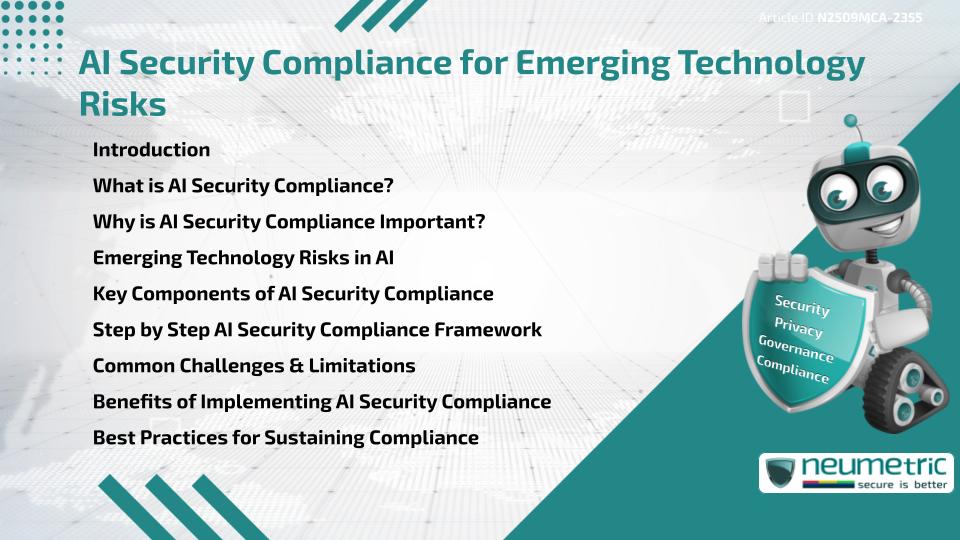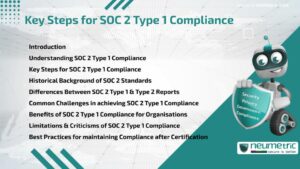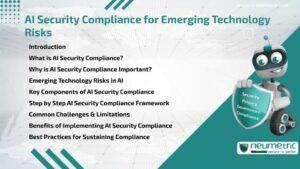Table of Contents
ToggleIntroduction
AI Security Compliance for emerging technology Risks is becoming a critical focus for Organisations that rely on Artificial Intelligence to process Sensitive Data & deliver services. With rapid technological advancements come new Threats, Vulnerabilities & Ethical concerns. This article explains what AI Security Compliance is, why it is essential, the Risks posed by emerging technologies & the Framework for establishing Compliance. It also explores challenges, benefits & Best Practices to ensure effective implementation.
What is AI Security Compliance?
AI Security Compliance refers to the structured approach Organisations use to ensure that Artificial Intelligence systems adhere to Security, Privacy & Ethical Standards. It involves aligning AI Development & deployment with established Frameworks, Regulations & industry Best Practices. The goal is to manage Risks such as unauthorised data access, algorithmic bias & lack of transparency.
Why is AI Security Compliance Important?
The importance of AI Security Compliance cannot be overstated. It:
- Protects Sensitive Data from Breaches & misuse
- Ensures Compliance with Privacy laws & Industry Regulations
- Enhances Trust among Stakeholders & Customers
- Minimises Risks associated with automated decision-making
- Encourages Responsible & Ethical use of AI Systems
Without Compliance, Organisations Risk legal penalties, reputational damage & increased Security Incidents.
Emerging Technology Risks in AI
Emerging technologies amplify Risks that demand careful consideration:
- Data Privacy Risks – AI often processes large volumes of Personal Data, raising Privacy concerns.
- Bias & Fairness Risks – Poorly designed AI Models may reinforce existing biases.
- Transparency Risks – Black-box algorithms limit understanding & Accountability.
- Adversarial Attacks – Malicious actors can manipulate AI Models to produce false results.
- Integration Risks – Combining AI with Internet of Things [IoT] or Cloud Services increases attack surfaces.
Key Components of AI Security Compliance
Effective Compliance relies on multiple components:
- Clear Governance structures
- Regular Risk Assessments
- Strong Data Protection measures
- Bias detection & mitigation strategies
- Transparent reporting & Accountability mechanisms
- Regular Audits & independent Assessments
Step by Step AI Security Compliance Framework
Following a structured process ensures consistency:
- Define Compliance Scope – Identify AI Systems & processes subject to Compliance.
- Conduct Risk Assessment – Evaluate Security, Privacy & Ethical Risks.
- Develop Policies – Establish guidelines for data handling, AI Model training & deployment.
- Implement Controls – Apply Security, Fairness & Transparency measures.
- Monitor Systems – Continuously track AI Performance & detect anomalies.
- Conduct Audits – Perform regular Internal & External Audits for accountability.
- Correct Non-Conformities – Address Gaps & strengthen weak Controls.
- Engage Stakeholders – Communicate Compliance measures to Staff, Partners & Regulators.
Common Challenges & Limitations
Despite its value, AI Security Compliance faces challenges:
- Evolving regulatory environments
- Limited availability of skilled Compliance professionals
- Difficulty in detecting algorithmic bias
- Balancing innovation with strict Compliance Controls
- Cost & resource constraints
Benefits of Implementing AI Security Compliance
When effectively implemented, AI Security Compliance:
- Enhances resilience against Cyber Threats
- Builds Customer & Stakeholder Trust
- Supports Legal & Regulatory adherence
- Promotes ethical AI adoption
- Encourages Continuous Improvement & Innovation
Best Practices for Sustaining Compliance
To sustain Compliance:
- Establish a cross-functional Governance team
- Update Compliance Frameworks regularly
- Train staff on Ethical & Secure AI Practices
- Use independent Third Party Audits for unbiased evaluation
- Integrate Compliance into the AI lifecycle from design to deployment
Takeaways
- AI Security Compliance manages emerging technology Risks effectively
- Structured frameworks improve Accountability & Resilience
- Regular Monitoring & Audits ensure Ethical & Secure AI use
- Compliance builds Trust & reduces Regulatory exposure
FAQ
What is the role of AI Security Compliance?
It ensures AI Systems meet legal, ethical & security requirements, minimising Risks & enhancing Trust.
How does AI Security Compliance reduce Risks?
It enforces structured controls to prevent data misuse, algorithmic bias & unauthorised access.
Which industries need AI Security Compliance the most?
Healthcare, Finance, Government & Technology industries face the highest Compliance demands due to Sensitive Data handling.
How often should AI Security Compliance Audits be conducted?
At least annually, though high-Risk AI Systems may require more frequent Assessments.
What frameworks support AI Security Compliance?
Frameworks such as NIST AI Risk Management Framework, ISO/IEC 23894 & GDPR guidelines provide strong foundations.
Can AI Security Compliance slow innovation?
If poorly managed, yes. However, when balanced properly, it promotes sustainable & responsible innovation.
What are the main barriers to AI Security Compliance?
Resource limitations, Lack of Expertise, evolving Threats & Regulatory uncertainty.
Need help for Security, Privacy, Governance & VAPT?
Neumetric provides organisations the necessary help to achieve their Cybersecurity, Compliance, Governance, Privacy, Certifications & Pentesting needs.
Organisations & Businesses, specifically those which provide SaaS & AI Solutions in the Fintech, BFSI & other regulated sectors, usually need a Cybersecurity Partner for meeting & maintaining the ongoing Security & Privacy needs & requirements of their Enterprise Clients & Privacy conscious Customers.
SOC 2, ISO 27001, ISO 42001, NIST, HIPAA, HECVAT, EU GDPR are some of the Frameworks that are served by Fusion – a SaaS, multimodular, multitenant, centralised, automated, Cybersecurity & Compliance Management system.
Neumetric also provides Expert Services for technical security which covers VAPT for Web Applications, APIs, iOS & Android Mobile Apps, Security Testing for AWS & other Cloud Environments & Cloud Infrastructure & other similar scopes.
Reach out to us by Email or filling out the Contact Form…





